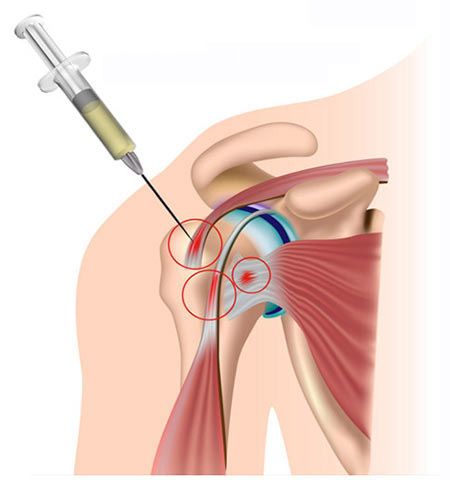 Midtown Manhattan
36 W 44th St Ste 1416 New York, NY 10036
Midtown Manhattan
36 W 44th St Ste 1416 New York, NY 10036
- (212) 621-7746
- text us
- BOOK ONLINE Call for Same Day Appointments
 Midtown Manhattan
36 W 44th St Ste 1416 New York, NY 10036
Midtown Manhattan
36 W 44th St Ste 1416 New York, NY 10036
Because of the range of motion your shoulder enjoys, the socket in the joint is the shallowest in your body, making it subject to injury. A cortisone injection in the shoulder relieves pain and inflammation. A cortisone injection shoulder is almost as good as new, which is the reason to look into getting a shoulder joint injection when you have joint pain. The effects of a shoulder steroid injection last for months, too. Come to our New York City pain control center to get your pain evaluation and treatment. Meet our pain doctor Febin Melepura M.D. to get the pain relief you need in the safe, reassuring hands of the best specialists in NYC.

It doesn’t matter whether your pain originated from an injury or from a medical condition like arthritis or tendonitis. Your pain and shoulder limitations are real, and you need relief. Consider getting a cortisone injection in the shoulder. If milder treatments like rest, ice, and over-the-counter pain medications haven’t helped, a shoulder joint injection may be the next step.
Shoulder pain and inflammation stop you from doing many things:
Since your shoulder joint is so shallow and yet often carries a heavy load, it’s a joint that takes a lot of wear and tear. As you age, it’s more likely that you’ll have shoulder issues. Some of the injuries and ailments that can plague your shoulders include:
Many of these are serious injuries. Most of them can be treated. But your doctor won’t start off recommending a shoulder steroid injection. Treatment starts with an accurate diagnosis. Your sports injury doctor in NYC gives you a complete physical exam and then takes a full medical history, including how you think you may have hurt your shoulder.
You may need additional tests, such as an x-ray, MRI, or CT scan. Your doctor needs to be certain about your diagnosis before committing to a treatment plan. Sometimes, you’ll start with conservative treatment options: rest, ice, physical therapy, and over-the-counter pain medicine. But if they don’t help, the next step may be a cortisone injection in the shoulder.
I had a great experience getting an injection in my scapula. Highly recommend.
L CWhile a shoulder joint injection isn’t a cure-all, it does help your shoulder heal from specific injuries and diseases. It definitely eases your pain and reduces the inflammation in your shoulder joint. With your pain reduced, you aren’t clutching your muscles constantly. With the inflammation down, your body can concentrate on healing.
Once you and your doctor have decided to pursue shoulder injections, the process itself is relatively easy and quick. The steps include:
Cortisone is a steroid drug that provides positive benefits in the short term, but your doctor knows you can’t have it too often. Too much can eat away at your cartilage, leaving you with arthritic symptoms.
You can have multiple shoulder injections, but they need to be at least six weeks apart, and you can’t have more than three or four injections a year. Shoulder joint injections, therefore, are not suitable for chronic pain.
While there are risks to the procedure, a cortisone injection in the shoulder has been used successfully for decades. The possible risks and potential side effects include:
To avoid these side effects, keep the injection location clean and dry. Don’t do any heavy lifting for a week; you need to give your body time to heal. Use a cold pack as needed. Call your doctor if your symptoms worsen.
Cortisone injection for the shoulder is aimed to ease the discomfort from your neck and down to your fingers. It is especially beneficial for chronic pain sufferers and athletes. Due to this treatment, athletes are able to avoid changes to their lifestyle and physical activities. Shoulder steroid injections have been in common medical practice since 1951 and they are proven to be successful in treating various shoulder injuries and ailments, including:
Shoulder injections contain corticosteroids, a safe compound that closely resembles a natural hormone called cortisol. The medication tricks your body into decreasing your immune system’s activity. This leads to a dramatic decrease in pain and swelling. In addition, the injection contains a small amount of local anesthetic, which limits pain immediately.
Shoulder injections are deemed safe when used appropriately. Their use should be limited to no more than 4 injections every twelve months. If you neglect this recommendation, you can encounter several side effects. Repeated use of injections has been shown to worsen arthritis, weaken the bones and tendons, and damage the joint and its cartilage. Hence, it is advised to control their frequent use.
Shoulder injections contain corticosteroids, a safe compound that closely resembles a natural hormone called cortisol. The medication tricks your body into decreasing your immune system’s activity. This leads to a dramatic decrease in pain and swelling. In addition, the injection contains a small amount of local anesthetic, which limits pain immediately.
Most patients expect cortisone injections for the shoulder to be very painful. But most are pleasantly surprised that it is not the case. During the time of injection, it should not hurt more than a common immunization needle. The pain level experienced during the procedure depends on how tolerant you are to the pain. Most patients report a greater degree of pain once the process is complete.
A steroid injection begins to work immediately, causing the inflammation to subside. But it usually takes 3 to 7 days to notice significant positive effects. It might take up to two weeks for the injection to decrease inflammation to the point when pain is improved.
The benefits of steroid injection can vary depending on the individual. Typically, foot injections last anywhere between 6 to 12 weeks if used alone. Longer-term relief can be achieved if a foot injection treatment is combined with other rehabilitation treatments like physical therapy.
The results of this procedure greatly depend on your medical condition and its severity. The pain that you may experience after the injection should pass over the next 48 hours. Once the procedure is performed, you can apply ice to relieve any discomfort you might feel at the injection site. If the pain lasts more than 48 hours, it is recommended to schedule a follow-up appointment as soon as possible.
As a rule of thumb, patients who have undergone steroid injections should avoid any strenuous activity that involves the shoulder. This should be done for the next 48 hours following the procedure. Light activities, like walking, are allowed. Make sure you monitor for any side effects that can be accompanied by redness, swelling, or fever above 100 degrees.
It is also prohibited to lift heavy objects. 10 days following the treatment, you are encouraged to start gentle range of motion exercises. You should remain active if you can tolerate exercises without any pain or discomfort.
It is okay to shower on the same day of the procedure. However, it is advised to avoid using heating pads, hot tub, or whirlpool for at least two days. You can always apply ice to the injection site if you need to relieve pain.
All insurance companies cover cortisone shots for the shoulder if they are deemed medically necessary. You have more chances to be reimbursed if you experience acute pain that has not improved with non-steroidal inflammatory drugs, like ibuprofen, lifestyle changes, or exercise therapy.
It has been proven that repeated cortisone shots can damage the cartilage within a joint. Therefore, specialists limit the number of injections to 4 shots per year. Generally, it is not recommended to receive a steroid injection more often than every six weeks.
Do you have any questions about the shoulder steroid injections? Would you like to schedule an appointment with the best-rated pain management doctor Febin Melepura MD of the sports pain management clinic in NYC? Please contact our office for a consultation with the pain relief specialist in Midtown Manhattan.
Sports Injury & Pain Management Clinic of New York
Febin Melepura, MD is a top rated, best in class interventional pain management doctor. He is a nationally recognized pain relief specialist and is among the top pain care doctors in New York City and the country. He is an award winning expert and contributor to a prominent media outlets.
Dr. Febin Melepura has been recognized for his thoughtful, thorough, modern approach to treating chronic pain and, among other accolades, has been named a “top pain management doctor in New York”, and one of “America’s Top Doctors™” for an advanced sports injury treatments.